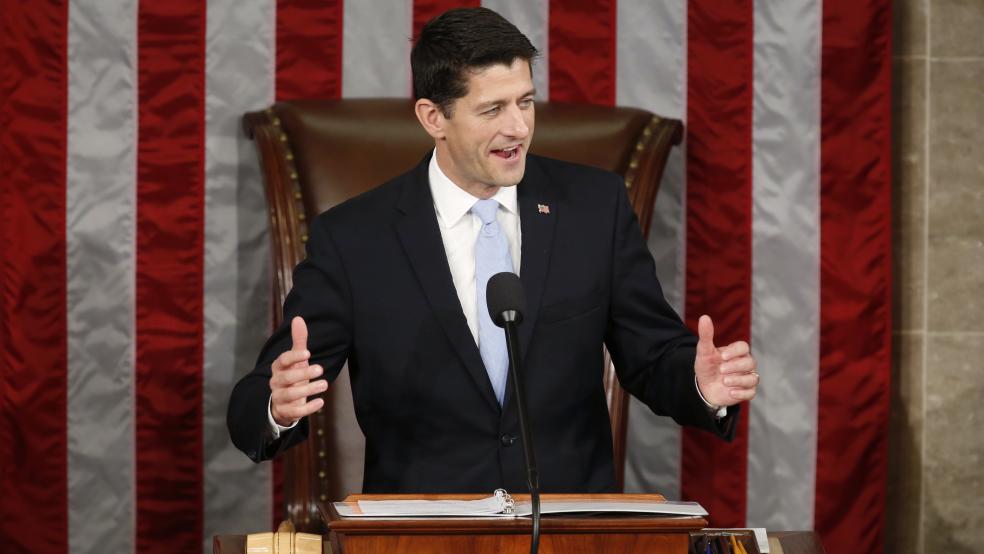Congress must approve more than $1.1 trillion of funding by Friday to keep the government operating for the remainder of fiscal 2016. But congressional leaders are far from reaching an agreement, raising the possibility of yet another budget crisis by the end of the week.
Republican and Democratic leaders in Congress spent last weekend desperately seeking a compromise on spending, taxes and key policy measures that would enable lawmakers to adjourn for the remainder of the holiday season and then turn their attention to the 2016 campaign and a new House GOP agenda in January. But they came up empty handed.
Related: Ryan’s Next Big Challenge: Prevent Another Government Shutdown
While there appears to be little appetite even among the most rabid of conservative Republicans for a repeat of the 2013 partial government shutdown, the early signs this week is that a final deal is highly elusive and that Congress may have no choice but to kick the can down the road by adopting another short-term extensions of spending authority -- a “continuing resolution” -- to keep the government afloat.
New House Speaker Paul D. Ryan (R-WI) made it clear in a speech last week that he has no patience with another government spending crisis and that his “number one goal for next year is to put together a complete alternative to the left’s agenda,” including a comprehensive GOP replacement for the Affordable Care Act. But in an interview on Monday with a radio station in his home town of Janesville, Ryan voiced doubt that Congress could complete its work by the end of this week, according to Politico.
Noting that there was still much to do in resolving differences over funding the government and renewing hundreds of billions of dollars’ worth of expiring tax breaks and credits, the speaker said that “it might take us more than just this week to get these issues put together correctly.” Ryan also said that he doesn't have an "exact timeline" for releasing an Obamacare replacement next year.
Former House Speaker John Boehner (R-OH) did Ryan a huge favor in late October by negotiating a fiscal 2016 budget agreement with the Obama administration and congressional Democrats setting the parameters for overall government spending through next Sept. 30 without Ryan having to leave his fingerprints on highly controversial legislation.
Related: Congress Finally Passes a $300 Billion Highway Bill
The agreement added $50 billion to fiscal 2016 spending, equally divided between defense and domestic programs, along with $16 billion of emergency spending on the war and State Department programs. The agreement pleased many GOP defense hawks and champions of Obama’s domestic programs, but it angered many GOP conservatives who complained that it cost too much and would add to the deficit.
Boehner left it to Ryan, Senate Majority Leader Mitch McConnell (R-KY) and House and Senate appropriators to pass legislation to divvy up the new spending in one massive appropriations bill. But the year-long spending bill has become bogged down and jeopardized by a series of disputes over policy riders or amendments ranging from the treatment of Syrian refugees and Obama environmental policy to oil exports.
Ryan has had it easy so far, helping to shepherd through a major highway bill and reauthorization of the No Child Left Behind legislation. But now he may be getting a taste of what Boehner experienced numerous times over the years in trying to amass a majority of Republican votes on controversial spending legislation.
The rocky weekend negotiating sessions followed House Democratic Leader Nancy Pelosi’s outright rejection of a House GOP spending plan unveiled on Friday that contained dozens of policy riders -- or “poison pills,” as some Democrats have called them. House Appropriations Committee Chair Hal Rogers (R-KY) told reporters late last week that he hoped to have a final package ready for House action by early this week, although that now seems well out of reach.
Related: Paul Ryan Flexes His Conservative Muscles in Contrast to Boehner
Among the Republicans’ latest list of demands, according to The Washington Post, are the following:
- Substantially increasing government screening of refugees from Syria and Iraq amid heightened concern that terrorists might slip into the United States masquerading as refugees. In the wake of the ISIS terrorist attacks on Paris, governors in 30 states called for a temporary pause in the resettlement of Syrian refugees until security concerns can be addressed. Republicans are also seeking to undermine President Obama’s controversial executive orders protecting millions of illegal immigrants from deportation.
- Granting the states authority to deny some federal funds to abortion providers in the wake of the controversy over Planned Parenthood’s past practice of charging fees in providing aborted fetal tissue to research groups. House GOP leaders dropped efforts to defund Planned Parenthood after a lone gunman killed three people at a Planned Parenthood clinic in Colorado in late November, but GOP lawmakers haven’t given up on finding a way to reduce funding.
- Scaling back the Obama administration’s initiatives to reduce pollution and greenhouse gas emissions, including the president’s Clean Power Program to set carbon dioxide emissions standards for coal-fired power plants, and the Environmental Protection Agency’s update of the Clean Water Rule, also known as the “Waters of the United States” rule, which extends federal protection to new U.S. waterways
- Dismantling portions of the 2010 Dodd-Frank financial industry regulations which was passed following the 2008 fiscal crisis. The financial reforms are a key part of Obama’s domestic policy legacy. The GOP is expected focus on aspects of the law that some moderate Democrats might go along with, such as easing rules for community banks.
- Adopting additional changes in the campaign finance law, including a proposal by McConnell to raise strict limits on how much money national party committees can spending to coordinate with individual candidates.





